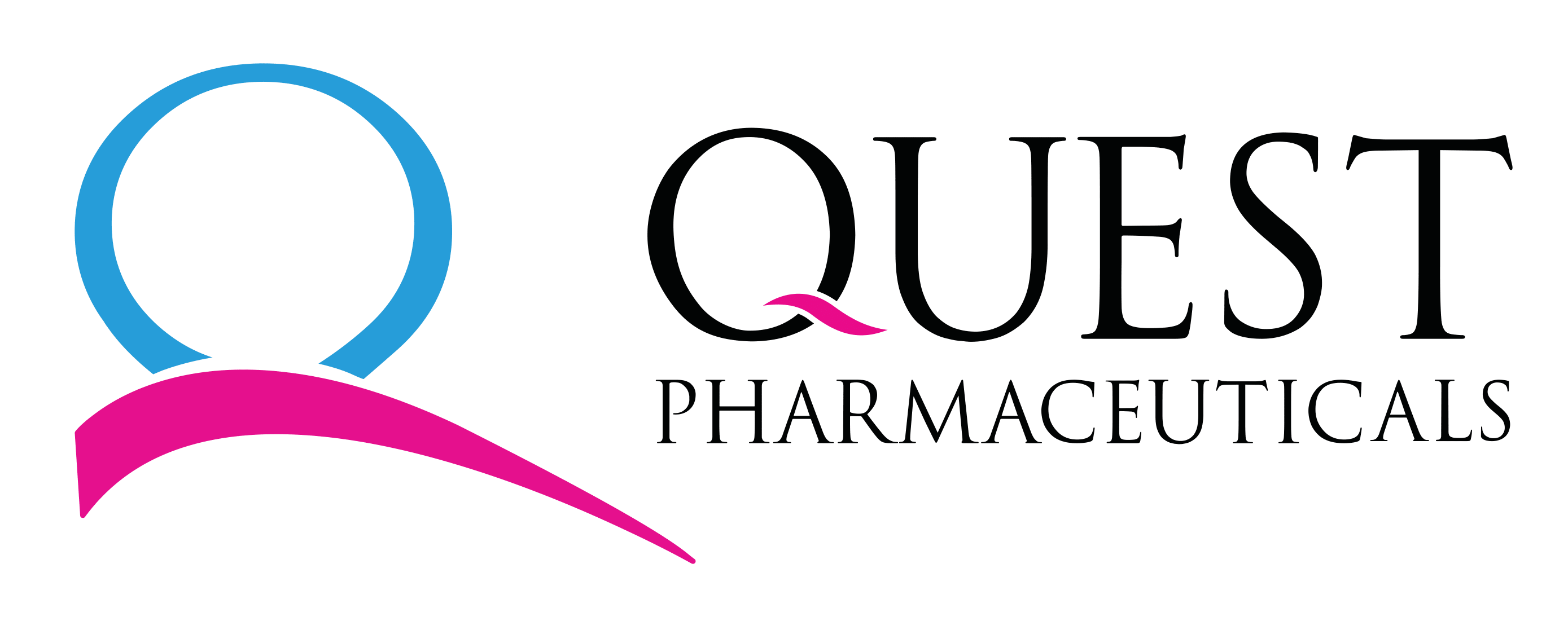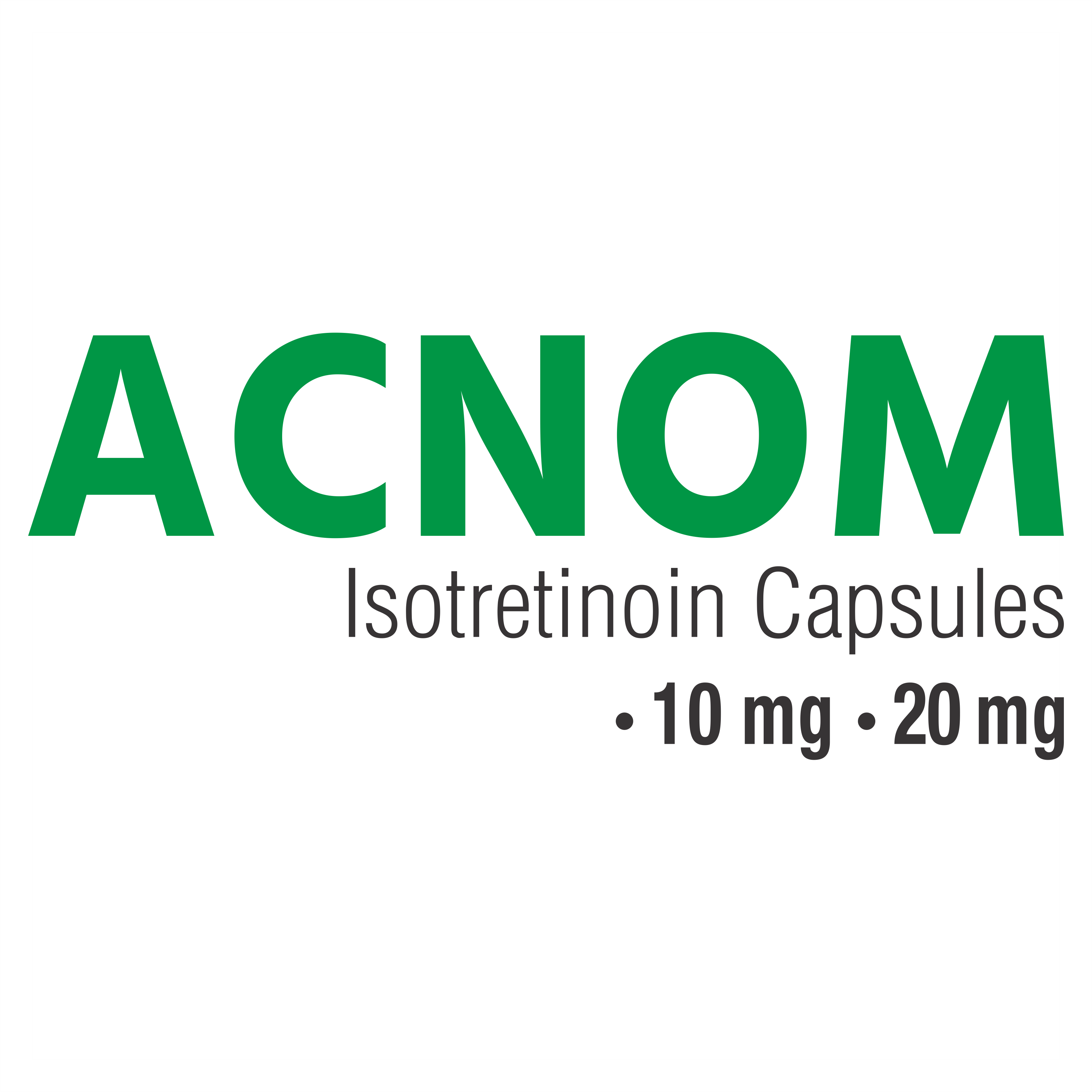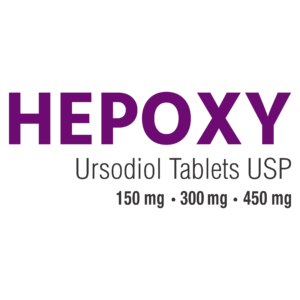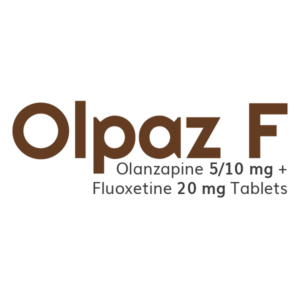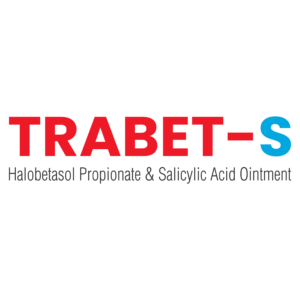ACNOM 10/20
| Generic Name | Isotretinoin Capsules USP |
| Strength | 10/20 mg |
| Dosage Form | Soft Gelatin Capsule |
Description
ACNOM contains isotretinoin – a substance related to vitamin A, and one of a group of medicines called retinoids (for treatment of acne). The retinoids work by reducing the amount of the oily substance (i.e. sebum) made by glands in your skin, reducing bacteria, reducing inflammation and opening clogged pores.
PATIENT INFORMATION LEAFLET
WARNING
CAN SERIOUSLY HARM AN UNBORN BABY
Women must use effective contraception.
Do not use if you are pregnant or think you may be pregnant
Read all of this leaflet carefully before you start taking this medicine because it contains important information for you.
- Keep this leaflet. You may need to read it again.
- If you have any further questions, ask your doctor or pharmacist.
- This medicine has been prescribed for you only. Do not pass it on to others. It may harm them, even if their signs of illness are the same as yours.
- If you get any side effects, talk to your doctor or pharmacist. This includes any possible side effects not listed in this leaflet.
What is in this leaflet:
- What ACNOM is and what it is used for
- What you need to know before you take ACNOM
- How to take ACNOM
- What are the possible side effects of ACNOM
- How to store ACNOM
- Contents of the pack and other information
1. What ACNOM is and what it is used for
ACNOM contains Isotretinoin – a substance related to vitamin A, and one of a group of medicines called retinoids (for treatment of acne).
The retinoids work by reducing the amount of the oily substance (i.e. sebum) made by glands in your skin, reducing bacteria, reducing inflammation and opening clogged pores.
ACNOM is used to treat severe forms of acne
- This is acne that can cause scars which do not go away
- These types of acne are also called ‘nodular’ or ‘conglobate’ acne
You will use ACNOM when your acne has not got better with anti-acne treatments, including antibiotics and skin treatments. ACNOM should not be used to treat prepubertal acne and not in children aged less than 12 years of age.
ACNOM treatment must be supervised by a dermatologist (a doctor specialized in the treatment of skin problems).
2. What you need to know before you take ACNOM
Do not take ACNOM
- If you are pregnant or breast-feeding
- If there is any chance you could become pregnant, you must follow the precautions under “Pregnancy prevention programme”, see section on “Warnings and precautions”.
- If you are allergic to isotretinoin,
- If you have liver disease
- If you have very high levels of blood fats (e.g. high cholesterol or triglycerides)
- If you have very high levels of vitamin A in your body (hypervitaminosis A)
- If you are receiving treatment with tetracyclines (a type of antibiotic) at the same time
- If you are unsure if any of the above applies to you, please talk to your doctor or pharmacist.
Warnings and precautions
Talk to your doctor or pharmacist before taking ACNOM:
- If you have ever had any kind of mental health problems. This includes depression, aggressive tendencies or mood changes. It also includes thoughts about hurting yourself or ending your life. This is because your mood may be affected while taking ACNOM. Your doctor will discuss how best to monitor your mental health during your treatment.
Talk to your doctor if you experience persistent pain in your lower back or buttocks during treatment with ACNOM. These symptoms may be signs of sacroiliitis, a type of inflammatory back pain. Your doctor may discontinue treatment with ACNOM and refer you to a specialist for treatment of inflammatory back pain.
ACNOM should not be used if any of the above applies to you. If you are not sure, talk to your doctor or pharmacist before taking this medicine.
Pregnancy prevention program
Women who are pregnant must not take ACNOM
This medicine can seriously harm an unborn baby (the medicine is said to be ‘teratogenic’) – it can cause serious abnormalities of the unborn baby’s brain, face, ear, eye, heart and certain glands (thymus gland and parathyroid gland). It also makes a miscarriage more likely. This may happen even if ACNOM is taken only for a short time during pregnancy.
- You must not take ACNOM if you are pregnant or if you think you might be pregnant.
- You must not take ACNOM if you are breastfeeding. The medicine is likely to pass into your milk and may harm your baby.
- You must not take ACNOM if you could get pregnant during treatment.
- You must not get pregnant for one month after stopping this treatment because some medicine may still be left in your body.
Women who could get pregnant are prescribed ACNOM under strict rules. This is because of the risk of serious harm to the unborn baby
These are the rules:
- Your doctor must explain the risk of harm to the unborn baby – you must understand why you must not get pregnant and what you need to do to prevent getting pregnant.
- You must have talked about contraception (birth control) with your doctor. The doctor will give you information on how not to get pregnant. The doctor may send you to a specialist for contraception advice.
- Before you start treatment, your doctor will ask you to take a pregnancy test. The test must show that you are not pregnant when starting treatment with ACNOM.
Women must use effective contraception before, during and after taking ACNOM
- You must agree to use at least one very reliable method of contraception (for example an intra uterine device or contraceptive implant) or, two effective methods that work in different ways (for example a hormonal contraceptive pill and a condom). Discuss with your doctor which methods would be suitable for you.
- You must use contraception for a month before taking ACNOM, during treatment and for a month afterwards.
- You must use contraception even if you do not have periods or you are not sexually active (unless your doctor decides this is not necessary).
Women must agree to pregnancy testing before, during and after taking ACNOM
- You must agree to regular follow-up visits, ideally every month.
- You must agree to have regular pregnancy tests, ideally every month during treatment and, because some medicine may still be left in your body, 1 month after stopping ACNOM (unless your doctor decides this is not necessary in your case).
- You must agree to extra pregnancy tests if your doctor asks you.
- You must not get pregnant during treatment or for a month afterwards because some medicine may still be left in your body.
- Your doctor will discuss all these points with you, using a checklist and will ask you (or a parent/guardian) to sign it. This form confirms that you have been told about the risks and that you will follow the rules above.
If you get pregnant while taking ACNOM, stop taking the medicine straight away, and contact your doctor.
Also, if you become pregnant within one month after you stop taking ACNOM, you should contact your doctor.
Additional precautions
You should never give this medicinal product to another person. Please take any unused capsules to your pharmacist at the end of treatment.
You should not donate blood during treatment with this medicine and for 1 month after stopping ACNOM because an unborn baby could be harmed if a pregnant patient receives your blood.
Advice for all patients
- Tell your doctor if you have ever had any mental illness (including depression, suicidal behaviour or psychosis), or if you take medicines for any of these conditions.
- Severe Skin reactions (e.g. erythema multiforme (EM), Stevens-Johnson syndrome (SJS) and toxic epidermal necrolysis (TEN)) have been reported with the use of ACNOM. The rash may progress to widespread blistering or peeling of the skin. You should also look for ulcers in the mouth, throat, nose, genitals and conjunctivitis (red and swollen eyes).
- Rarely, ACNOM may cause severe allergic reactions some of which can affect skin in the form of eczema, hives and bruises or red patches on arms and legs. If you develop an allergic reaction, stop taking ACNOM, seek urgent advice from a doctor and tell him that you are taking this medicine.
- Cut down on intensive exercise and physical activity. ACNOM can cause muscle and joint pain particularly in children and teenagers undertaking vigorous physical activity.
- ACNOM may cause dry eyes, intolerance to contact lenses and visual difficulties including decreased night vision. Cases of dry eyes not resolving after discontinuation of therapy have been reported.
- Tell your doctor if you have any kidney problems. Your doctor may start you on a lower dose of ACNOM and then increase it to the maximum tolerated dose.
- Your skin is likely to get dry. Use a skin moisturising ointment or cream and a lip balm during treatment. To prevent skin irritation, you should avoid using exfoliating or anti-acne products.
- Don’t have any cosmetic skin treatments. ACNOM may make your skin more fragile. Don’t have any waxing (hair removal), dermabrasion or laser treatments (removing horny skin or scars) during treatment, or for at least 6 months after treatment. They could cause scarring, skin irritation, or rarely, changes in the colour of your skin.
- Isotretinoin has been associated with sexual problems. These include problems getting or maintaining an erection, lower libido, vaginal dryness, orgasm difficulties and reduced sensation in the genitals.
Children and adolescents
The use of ACNOM in children under the age of 12 is not recommended. This is because it is not known if it is safe or effective in this age group.
ACNOM should not be used to treat prepubertal acne and not in children aged less than 12 years of age. If you are aged under 18 years of age, you must not take ACNOM unless two prescribers have agreed that your condition does not respond adequately to other treatments and the benefits of treatment outweigh the risks.
Other medicines and ACNOM
Tell your doctor or pharmacist if you are taking, have recently taken or might take any other medicines including herbal and non-prescription products.
- Do not take vitamin A supplements or tetracyclines (a type of antibiotic), or use any skin treatments for acne while you are on ACNOM. It is fine to use moisturisers and emollients (skin creams or preparations that prevent water loss and have a softening effect on the skin).
- Avoid the use of topical keratolytic or exfoliative anti-acne agents while you are on ACNOM.
Pregnancy and breast-feeding
If you are pregnant or breast-feeding, think you may be pregnant or are planning to have a baby, ask your doctor for advice before taking this medicine.
Driving and using machines
You may not see as well at night during your treatment. This can happen suddenly. In rare cases this has continued after the treatment has stopped. Drowsiness and dizziness have been reported very rarely. If this happens to you, you should not drive or operate machinery.
3. How to take ACNOM
Always take ACNOM exactly as your doctor has told you. Check with your doctor or pharmacist if you are not sure.
The usual starting dose is 0.5 mg per kilogram body weight per day (0.5 mg/kg/day). So if you weigh 60 kg, your dose will usually start at 30 mg a day.
Take the capsules once or twice daily.
Take on a full stomach. Swallow them whole, with a drink or a mouthful of food.
If you take more ACNOM Capsules than you should
If you take too many capsules or someone else accidentally takes your medicine, contact your doctor, pharmacist or nearest hospital immediately.
If you forget to take ACNOM
- If you miss a dose take it as soon as you can. However, if it is nearly time for your next dose, skip the missed dose and carry on as before. Do not take a double dose (two doses close together).
4. What are the possible side effects of ACNOM
Like all prescription medicines, ACNOM may cause side effects.
Tell your doctor if you notice or have any of the following:
Side effects requiring immediate medical attention:
Skin problems
Frequency not known (frequency cannot be estimated from available data)
- Serious skin rashes (erythema multiforme, Stevens- Johnson syndrome, and toxic epidermal necrolysis), which are potentially life-threatening and require immediate medical attention.
If you develop a serious rash or these skin symptoms, stop taking ACNOM and contact your doctor immediately.
Mental problems
Rare effects (may affect up to 1 in every 1000 people)
- Becoming violent or aggressive.
Very rare effects (may affect up to 1 in every 10,000 people)
- Unusual behaviour.
- Signs of psychosis: a loss of contact with reality, such as hearing voices or seeing things that are not there.
Frequency not known (frequency cannot be estimated from available data)
- Depression or related disorders. Signs of this include sad or altered mood, anxiety, feelings of emotional discomfort,
- Existing depression getting worse.
- Some people have had thoughts about hurting themselves or ending their own lives (suicidal thoughts).
Allergic reactions
Rare effects (may affect up to 1 in every 1000 people)
- Serious (anaphylactic) reactions: difficulty breathing or swallowing caused by sudden swelling of the throat, face, lips and mouth. Also sudden swelling of the hands, feet and ankles.
Very rare effects (may affect up to 1 in every 10,000 people)
- Sudden tight chest, shortness of breath and wheezing, particularly if you have asthma.
If you have a serious reaction, get emergency medical help immediately.
If you have any allergic reaction, stop taking ACNOM and contact your doctor.
Bones and muscles
Frequency not known (frequency cannot be estimated from available data)
- Muscle weakness which can be potentially life-threatening, may be associated with trouble moving arms or legs, painful, swollen, bruised areas of the body, dark-coloured urine, reduced or no urine output, confusion or dehydration.
Liver and kidney problems
Very rare effects (may affect up to 1 in every 10,000 people)
- Yellow skin or eyes, and feeling tired. These can be signs of hepatitis. Stop taking ACNOM straight away and contact your doctor.
- Difficulty urinating (passing water), swollen and puffy eyelids, feeling excessively tired.
Nervous system problems
Very rare effects (may affect up to 1 in every 10,000 people)
- Lasting headache, along with feeling sick (nausea), being sick (vomiting) and change in your eyesight including blurred vision.
Very rare effects (may affect up to 1 in every 10,000 people)
- Severe abdominal (tummy) pain, with or without severe bloody diarrhoea, feeling sick (nausea) and being sick (vomiting).
Eye disorders
Very rare effects (may affect up to 1 in every 10,000 people)
- Blurred vision.
Other side effects:
Very common side effects with ACNOM: (may affect more than 1 in 10 people)
- Dryness of the skin, especially of the lips and face; inflamed skin, chapped and inflamed lips, rash, mild itching and slight peeling.
- Skin becomes more fragile and redder than usual, especially the face.
- Back pain; muscle pain; joint pain particularly in children and teenagers.
- To avoid making any bone or muscle problems worse, cut down on intensive physical activity while you’re on ACNOM.
- Inflammation of the eye (conjunctivitis) and eyelid area; eyes feel dry and irritated.
- Raised liver enzymes seen in blood tests.
- Changed levels of fats in the blood (including HDL or triglycerides).
- Bruising, bleeding or clotting more easily – if clotting cells are affected.
- Anaemia – weakness, dizziness, pale skin – if red blood cells are affected.
Common side effects with ACNOM: (may affect up to 1 in 10 people)
- Higher levels of cholesterol in the blood.
- Protein or blood in the urine.
- More liable to get infections – if the white blood cells are affected.
- Inside of the nose becomes dry and crusted, causing mild nosebleeds.
- Allergic reactions such as rash, itchiness.
5. How to store ACNOM
Keep this medicine out of the sight and reach of children. Do not use this medicine after the expiry date which is stated on the blister and carton after EXP.
Store this medicine below 25 ºC.
The expiry date refers to the last day of that month.
Store in the original package and keep blister in the outer carton in order to protect from moisture and light.
Do not throw away any medicines via wastewater or household waste. Ask your Pharmacist how to throw away medicines you no longer use. These measures will help protect the environment.
6. Contents of the pack and other Information
The active ingredient is Isotretinoin.
ACNOM 10
Each soft gelatin capsule contains:
Isotretinoin USP 10 mg
Approved colours used in capsule shell
ACNOM 20
Each soft gelatin capsule contains:
Isotretinoin USP 20 mg
Approved colours used in capsule shell
ACNOM 10 is red coloured, oval shaped soft gelatin capsules. ACNOM 10 capsules are packed in PVDC Blister. The pack size is 10 x 10 capsules in a printed paper carton.
ACNOM 20 is purple coloured, oval shaped soft gelatin capsules. ACNOM 20 capsules are packed in PVDC Blister. The pack size is 10 x 10 capsules in a printed paper carton.
